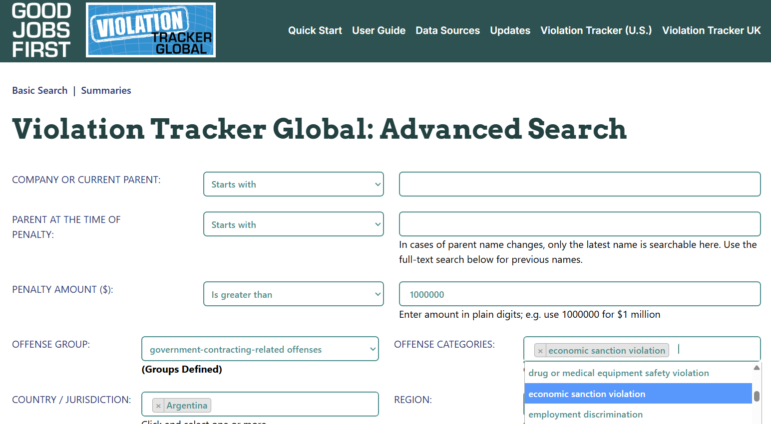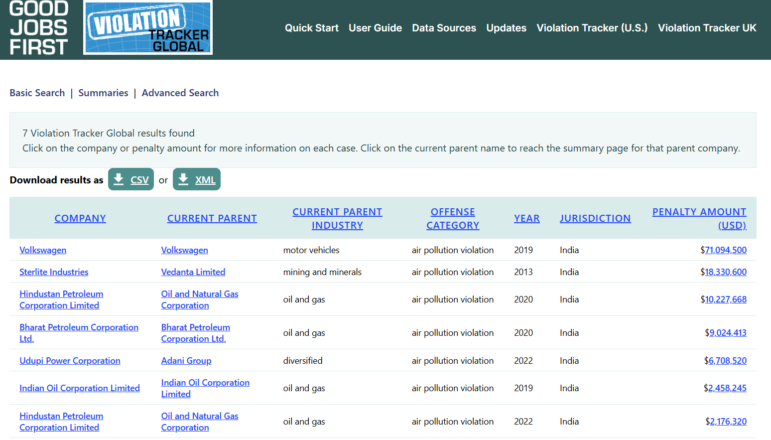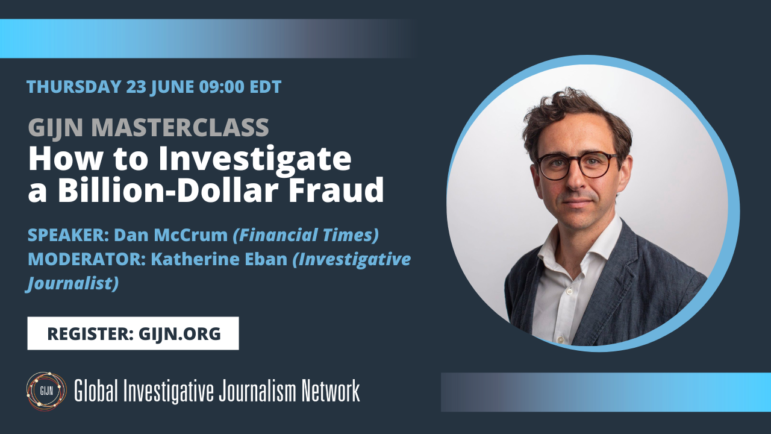

Image: Shutterstock, Dennis MacDonald
New Free Tools to Track Corporate Misconduct Around the World
Large corporations often quietly pay individual fines for environmental, financial, or labor abuses without reporters noticing, or have patterns of misconduct that can be hard to quantify or easily missed. Sometimes, smaller companies will pay regulatory penalties without journalists realizing that they are subsidiaries controlled by influential parent companies or billionaires.
But several free tools now track and aggregate penalties for corporate misconduct in an ever-growing total of 59 countries around the world, offering investigative reporters both authoritative details and abuse patterns at a glance, and easy ways to poke holes in greenwashing or public relations-polished claims about good governance.
Developed by the Corporate Research Project at the US-based NGO Good Jobs First, the flagship Violation Tracker database now includes 684,000 penalties and settlements involving 450 federal and state regulatory agencies in the United States, going back to 2000. These include bad corporate behavior ranging from wage theft to anti-competitive practices and illegal polluting activities, and are often relevant to both domestic and international investigations due to the large number of multinational firms operating in the US. The project also features an almost-as-detailed database for the United Kingdom — Violation Tracker UK (VT UK) — featuring 117,000 cases resolved by 80 agencies since 2010.
However, a workshop at the recent NICAR 2025 data journalism summit in the US revealed that the project has launched a much broader Violation Tracker Global (VT Global) portal, which offers less comprehensive but nonetheless unique and valuable data on corporate misconduct from 57 additional countries and territories.
“Right now, it covers 1,700 parent companies in those countries, and data going back to 2010,” explained Siobhan Standaert, a research analyst for the project. “It is not as robust as Violation Tracker; it’s a lot of countries to cover, where disclosure is often worse, and companies are exposed in many different ways. But it is a way to see how the biggest companies you’re writing about are behaving, and what their record really is like in smaller countries.” (There is an explainer on the differences between the three datasets and an updates log of when new sources are added.)

Violation Tracker Global’s advanced search dashboard. Image: Screenshot
Finding Repeat Corporate Offenders
Last year, USA Today used Violation Tracker to expose potential conflicts of interest for Tesla CEO Elon Musk in his new government role by showing that the company had paid a total of almost $100 million in government penalties, including 73 separate enforcement actions by agencies such as the Environmental Protection Agency, the Justice Department, the Securities and Exchange Commission, and the Occupational Safety and Health Administration.
Meanwhile, the Guardian found a creative use for VT UK’s top offenders summaries, in showing that the worst-behaved companies in the UK are also among those most rewarded with government contracts.
Countries included in the new VT Global tool range from Argentina and Israel to Kenya and China, and the database is built downward from the largest economies. The project plans to add several more nations later this year, starting with Peru and Colombia.
Rather than focusing on where companies are registered, this tool records penalties in the nations where the offenses occurred, and therefore typically reveals local misconduct by multinational firms. For instance, the South African-registered telecommunications giant MTN is recorded as the most-penalized company in Nigeria, with US$916 million in fines and settlements accrued across one environmental and five consumer protection violations.
Browsing the tool also offers bountiful investigative story ideas. You can just surf around the ‘offenses’ filters to find both the likely culprits — such as notorious auto manufacturer and bank reoffenders — and unexpected bad actors in vulnerable nations.
“What we find is that the same companies keep showing up over and over across countries, and do not really change their behavior,” Philip Mattera, project director of Violation Tracker, explained in a follow-up interview. “These tools are essentially an index of recidivism, showing how large companies are breaking the rules over and over again, and that the penalties they’re paying are not much of a deterrent.”
Reporters can also search or cross-check corporate misconduct data on some countries via other resources, such as the Business and Human Rights Resource Centre and the Corporate Prosecution Registry. However, Good Jobs First’s Arlene Martinez said: “We think Violations Tracker really is the largest publicly available free-to-use corporate misconduct database in the world.”
The hall for this Nicar workshop in Minneapolis was so packed that reporters sat in the aisles all the way to the front screen; perhaps in response to these four prized features of the tools:
- While data downloads and court document access involve small subscription fees on the US and UK versions, all searches across the three databases, including VT Global, are free.
- The tools always list what the parent company was at the time of the offense by a subsidiary, as well as the current parent, so reporters can be precise with accountability. Fines in local currencies are also always converted to their USD equivalent.
- The data offers low-stress and easy verification citation options for investigative reporters, as they do not include allegations or contested cases, but settled regulatory or class action cases, and penalty figures are linked back to the source agency.
- Corporate research methods are used to tie parent companies with their subsidiaries throughout, so it can aggregate fines and offense types, and disentangle corporate webs.
“Parent-subsidiary matching is a unique feature of the tool, and what makes it so powerful,” said Standaert. “So you have a company saying ‘Oh, we didn’t even know about that’ — but because you can now link it up to its parent company, and all its tentacles, you can poke holes in corporate claims about ‘isolated incidents.’”
Another new feature offered by the project is a “Mega-scandal summaries” filter, which shows cases related to offenses of over $25 million in penalty amounts. For instance, clicking on either “cryptocurrency” or “sanctions violations” in the Mega-scandals drop-down menu will bring up fines and settlement records for about a dozen corporations each. Standaert noted that the various trackers focus on major violations and recidivist companies, and therefore do not include penalties of under $5,000.
Attendees learned that VT Global also offers an Advanced Search feature, where you can search by violation category and country to find those firms that have been most damningly caught for that kind of misbehavior. For instance, clicking on ‘government contracting-related offenses’ and ‘South Korea’ immediately offers nine major cases of procurement or contracting wrongdoing. (Tip: Mattera suggests that reporters select both the general ‘offense group’ — such as healthcare violations – and a specific ‘offense category,’ such as ‘PFAS violations,’ in the Advanced Search page to focus searches.)

A sample page from the Violations Tracker Global tool of corporate air pollution fines assessed by the government of India. Image: Screenshot
How Data Is Compiled
While the US and UK versions rely on readily available government datasets, Mattera said building VT Global involved a creative mix of additional sources and strategies. In addition to the problem of lax enforcement and transparency in many countries, Mattera said one specific challenge — particularly in European Union countries — involves strict privacy laws that result in company names being redacted by regulators.
“For example, in Germany, they have employment courts that hear labor standards cases, and they publish their decisions, but they redact the names of the employers; I don’t understand why,” said Mattera. “In other places, cases are handled not by national regulators but by local prosecutors, and no one is aggregating the results of these cases. In some of these cases, the results are published by the local media, and we decided that we can use the media as a basis for creating an entry if we can also identify a reliable secondary source.”
Much of the VT Global data is painstakingly gathered from local agency press releases, and with the help of tools such as LexisNexis and Google Translate. Remarkably, the data is checked and entered manually by the project team.
“We’re not using AI, because we don’t trust the accuracy of AI yet,” he added. “So it means going through thousands and thousands of documents, and scanning them for relevance.”
The caveats for this tool include limited enforcement and disclosure by regulators in many countries, and politically motivated enforcement in the authoritarian countries included.
While Violation Tracker results, like those from any open source database, should be verified by reporters, Mattera said he was confident in the accuracy of individual amounts, while cautioning that reporters should understand many corporate offenses in many countries are either not prosecuted or not yet captured by VT Global.
“Although there is generally good disclosure on competition issues, we ourselves are limited by the fact that some countries are just not good at disclosing certain other categories of cases, particularly environmental and labor issues,” said Mattera. “But we are making an extensive effort to be as thorough as possible, and we are very happy to assist journalists with custom datasets.” (Reporters can find contact information for Mattera via the website).
These tools offer unique insights into the selectivity of regulatory enforcement. For example, for most of the 59 total countries in VT Global’s database, penalties for labor and environmental abuses lag far behind those for antitrust and consumer protection violations, with banks fined far more commonly than companies that control factories. Simply put: the data suggests that many governments care far more about crimes against investors than crimes against workers and the environment.
“You’ll see many, many billion-dollar fines against banks,” Martinez explained. “You can see the choices that are made by governments about what’s valued.”
Meanwhile, reporters can also use these tools in reverse: to check the activity of government regulators. The US version of the tool includes a ‘Presidential Administration’ filter, which shows, for instance, hundreds of wage theft enforcement actions against companies every two months during the Biden administration. The number of wage theft actions taken in the two months since the Trump administration took over in January 2025: Zero.
 Rowan Philp is GIJN’s Global Reporter and Impact Editor. He was formerly chief reporter for South Africa’s Sunday Times. As a foreign correspondent, he has reported on news, politics, corruption, and conflict from more than two dozen countries around the world.
Rowan Philp is GIJN’s Global Reporter and Impact Editor. He was formerly chief reporter for South Africa’s Sunday Times. As a foreign correspondent, he has reported on news, politics, corruption, and conflict from more than two dozen countries around the world.









